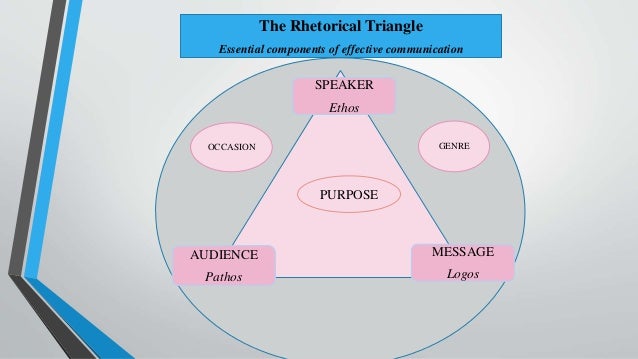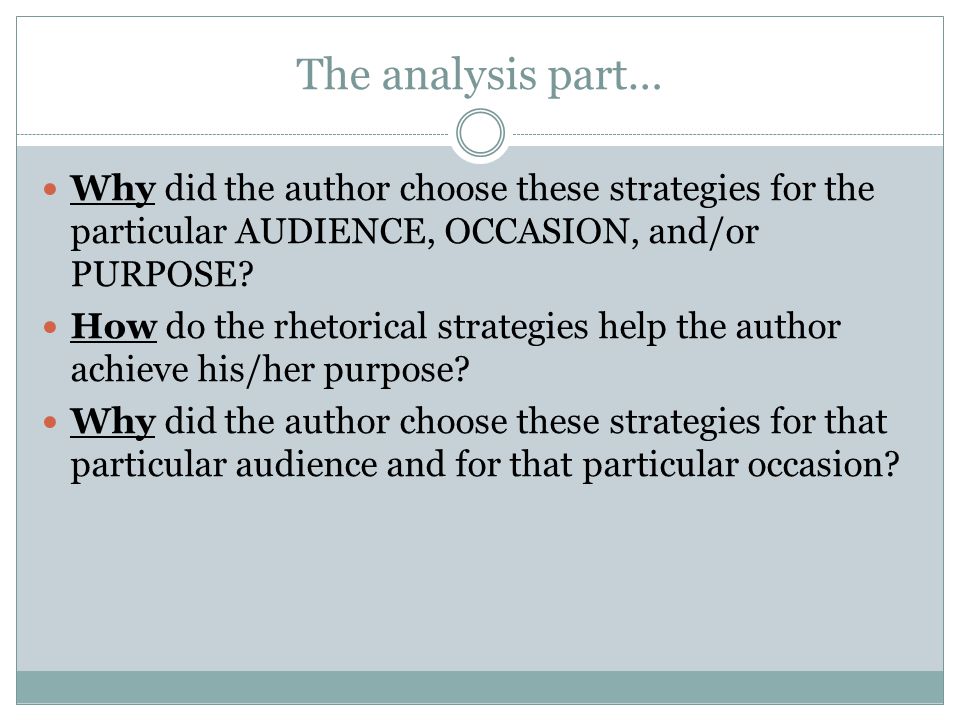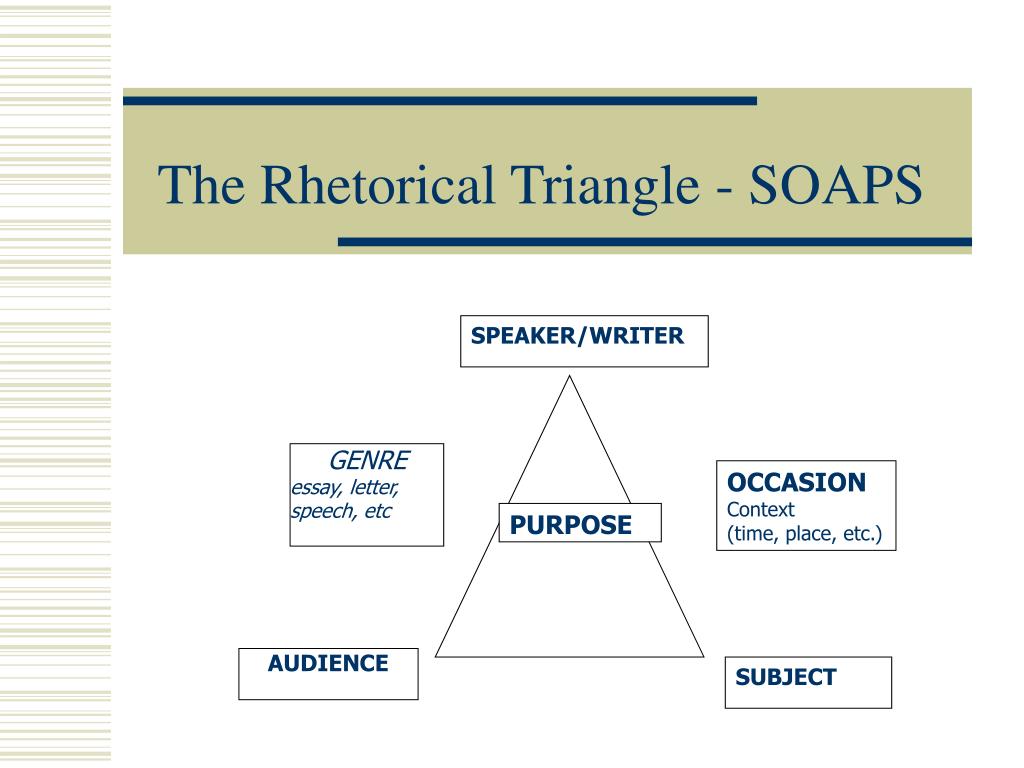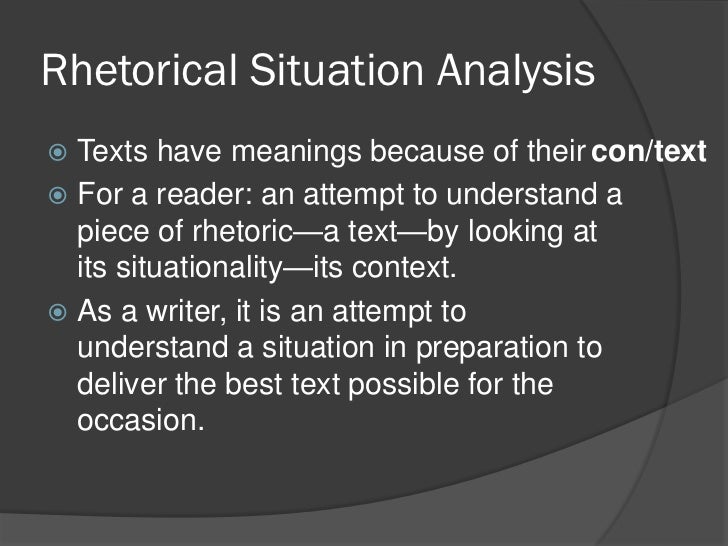Occasion Rhetorical
Writing a rhetorical analysis essay for academics can be really demanding for the students. This type of paper requires high level analyzing abilities and professional writing skills to be drafted effectively.
- Occasion Rhetorical Situation
- Rhetorical Occasion Refers To
- Occasion Rhetorical Term Definition
- Rhetorical Occasion Means
As this essay persuades the audience, it is essential to know how to take a strong stance and develop a thesis statement. This article will find some examples that will help you with your rhetorical analysis essay thesis statement effortlessly.
Occasion Rhetorical Situation
Contents
It stands for Speaker, Occasion, Audience, Purpose, Subject and Tone. Following this strategy helps you plan the essay and approach it in an organized manner. Read on to know what each of these crucial elements constitute and the questions you need to answer while writing a rhetorical analysis essay. Determine the Persuasion Strategy. According to Aristotle, any spoken or written communication. The rhetorical situation analysis consists of four elements: audience, occasion, speaker and speech, each assessing the quality of speech. In this essay, I will analyze the rhetorical situation of the historical speech “The Challenger Address” delivered by the 40th president of the United States, Ronald Reagan. Whitley Easton Rhetorical Analysis Practice #1 9/18/2020 Set 1 AP Lang and Composition Speaker- Margret Thatcher Occasion- Ronald Reagan’s death Audience- The American people Purpose- To honor former president Ronald Reagan whom she had been close with; to give hope for the future Subject- Ronald Reagans leadership and the impact he made Tone- Sad, serious, mourning, formal. For others, “rhetoric” may imply something more negative like “trickery” or even “lying.” So to appreciate the benefits of understanding what rhetorical situations are, we must first have a more complete understanding of what rhetoric itself is. In brief, “rhetoric” is any communication used to modify the perspectives of others.
Rhetorical Analysis Essay Example
The writing process of a rhetorical analysis is far more complicated than ordinary academic essays. This essay type critically analyzes the rhetorical means used to persuade the audience and their efficiency.
The example provided below is the best rhetorical analysis essay example:
Rhetorical Analysis Essay Sample (PDF)
In this essay type, the author uses rhetorical approaches such as ethos, pathos, and logos. These approaches are then studied and analyzed deeply by the essay writers to weigh their effectiveness in delivering the message.
If you are drafting a rhetorical analysis essay, it is essential to first go through a couple of examples. This is to be clear of the outline and structure that a rhetorical analysis essay must-have.
According to the essay outline, the essay is divided into three sections:
- Introduction
- Main Body
- Conclusion
A rhetorical analysis essay outline is the same as the traditional one. The different parts of the rhetorical analysis essay are written in the following way:
Rhetorical Analysis Introduction Example

The introductory paragraph of a rhetorical analysis essay is written for the following purpose:
- In order to provide basic background information about the chosen author and the text.
- Identify the target audience of the essay
An introduction for a rhetorical essay is drafted by stating an opening sentence known as the hook statement. This catchy sentence is prepared to grab the audience’s attention to the paper.
After the opening sentence, the background information of the author and the original text are provided.
For example, a rhetorical analysis essay written by Lee Jennings on“The Right Stuff” by David Suzuki. Lee started the essay by providing the introduction in the following way:
“ David Suzuki’s “The Right Stuff” features the gracious, entertaining, and informative style we have come to associate with this well-known host of The Nature of Things. He begins with the interesting speculation from the book Is There Life After High School? that “impressions formed in high school are more vivid and indelible than those formed at any other time in life.” Suzuki stresses the importance of high school education and prepares his readers for a proposal related to making that education as valuable as possible. A rhetorical analysis reveals the varying degrees of success with which Suzuki employs logos, pathos, and ethos: while Suzuki’s ethos is strong because of the reputation he brings to his writing and his use of pathos to appeal to his target audience of parents and educators, his use of logos is weak.”
Here Jennings stated the background information about the text and highlighted the rhetorical techniques used and their effectiveness.
Thesis Statement Example for Rhetorical Analysis Essay
A thesis statement of a rhetorical analysis essay is the writer’s stance on the original text. It is the argument that a writer holds and proves it using the evidence from the original text.
A thesis statement for a rhetorical essay is written by analyzing the following elements of the original text:
- Diction - The author’s choice of words and the tone
- Imagery - The visual descriptive language that the author used in the content.
- Simile - The comparison of things and ideas
In Jennings analysis of “The Right Stuff” the thesis statement was:
“Suzuki is skilled in argumentation, but his strong ethos fails to make up for the lack of support for his thesis that high school science courses should begin with sex education.”
Example For Rhetorical Analysis Thesis Statement (PDF)Rhetorical Analysis Conclusion Example
All the supporting information about the thesis statement is presented in the body section. Each point that supports the thesis is presented in a paragraph where it is analyzed.
All the body paragraphs lead the audience towards the conclusion. Here the final verdict about the text is provided.
For example, the conclusion of “The Right Stuff” is written in the following way by Jennings:
“ The major question overlooked by Suzuki’s essay—one of logistics-- is how can the schools, understaffed and overstressed, add the difficult subject of sex education to their curriculum. Admittedly, David Suzuki wrote his essay at a time when education budgets were in better shape than they are today, and he certainly makes an excellent point that educators should respect their students and appeal to their interests. Nevertheless, his argument for sex education in schools clearly needs further thinking. In spite of Suzuki’s strong ethos and persuasive use of pathos, he needs a stronger use of logos to make an argument here. The best he can hope for is to get his audience’s attention – then it is up to them to see if and how his ideas should be implemented in the schools.”
In the conclusion section, Jennings summarized the major points and restated the thesis statement to make sure that it is proved.
Rhetorical Essay Example For The Right Stuff by David Suzuki (PDF)

AP Language Rhetorical Analysis Essay Example
Writing a rhetorical analysis for AP Language and Composition course can be challenging. So drafting it correctly is important to earn good grades. To make your essay effective and winning, follow the tips provided by professionals below:
Understand the Prompt
Understanding the prompt is the first thing to produce an influential rhetorical paper. It is mandatory for this academic writing to read and understand the prompt to know what the task demands from you.
Stick To The Format
The content for the rhetorical analysis should be appropriately organized and structured. For this purpose, a proper outline is drafted. The rhetorical analysis essay outline divides all the information into different sections, such as introduction, body, and conclusion. The introduction should explicitly state the background information and the thesis statement.
All the body paragraphs should start with a topic sentence to clearly convey a claim for the readers. Provide a thorough analysis of these claims in the paragraph to support your topic sentence.
Use Rhetorical Elements to Form Argument
Analyze the following things in the text to form an argument for your essay:
- Language (tone and words)
- Organizational structure
- Rhetorical Appeals ( ethos, pathos, and logos)
Once you have analyzed the rhetorical appeals and other devices like imagery and diction in the text, you can form a strong thesis statement. The thesis statement will be the foundation on which your essay will be standing.
AP Language Rhetorical Essay Sample (PDF)AP Rhetorical Analysis Essay Template (PDF)
Visual Rhetorical Analysis Essay Example
The visual rhetorical analysis essay determines how pictures and images communicate messages and persuade the audience. Usually, the visual rhetorical analysis papers are written for advertisements as they use strong images to convince the audience to behave in a certain way.
In order to draft a perfect visual rhetorical analysis essay, follow the tips below:
Rhetorical Occasion Refers To
- Analyze the advertisement deeply and note every minor detailing.
- Notice objects and colors used in the image to gather every detail.
- Determine the importance of the colors and objects and analyze why the advertiser chose the particular picture.
- See what you feel about the image
- Consider the objective of the image. Identify the message that the image is portraying.
- Identify the targeted audience and how they respond to the picture.
To give students a better idea of the concept, an example is provided below.
Simplicity Breeds Clarity Visual Rhetorical Analysis Essay Example (PDF)Rhetorical Analysis Essay Writing Tips
Expert writers at MyPerfectWords.com have gathered some easy tips and tricks to draft an effective rhetorical analysis essay. Follow the tips provided below to make your rhetorical writing compelling.

- Choose an engaging topic for your essay. The rhetorical analysis essay topic should be engaging to grab the reader’s attention.
- Thoroughly read the original text.
- Identify the SOAPSTone. From the text, determine the speaker, occasions, audience, purpose, subject, and tone.
- Develop a thesis statement to state your claim over the text.
- Draft a rhetorical analysis essay outline.
- Write an engaging essay introduction by giving a hook statement and background information. At the end of the introductory paragraph, state the thesis statement.
- The body paragraphs of the rhetorical essay should have a topic sentence. Also, in the paragraph, a thorough analysis should be presented.
- For writing a satisfactory rhetorical essay conclusion, restate the thesis statement and summarize the main points.
- Proofread your essay to check for mistakes in the content. Make your editings before submitting the draft.
Following the tips and the correct writing procedure of the essay will guarantee you success in your academics. If you are still struggling to draft a good rhetorical analysis essay, it is suggested to take professional’s help at MyPerfectWords.com.
MyPerfectWords.com can assist you in all your academic assignments. The essay writing service that we provide is legal and reliable. If you are confused about your writing assignments, and have difficulty meeting the deadline, get help from the professionals at MyPerfectWords.com.
Place your order at the most reasonable prices.
368 pp., 6 x 9.25, notes, bibl., index
- Paperback ISBN: 978-0-8078-5777-9
Published: October 2006 - eBook ISBN: 978-0-8078-7738-8
Published: September 2007
Buy this Book
- E-Book $25.99
For Professors:
Free E-Exam Copies
Occasion Rhetorical Term Definition
collects twenty-four of his major essays and reviews, plus a sampling of entries on literary theory and contemporary culture from his award-winning weblog.Selected to showcase the range of public writing available to scholars, the essays are grouped into five topical sections: the Sokal hoax and its effects on the humanities; cosmopolitanism, American studies, and cultural studies; daily academic life inside and outside the classroom; the events of September 11, 2001, and their political aftermath; and the potential discursive and tonal range of academic blog writing. In lively and entertaining prose, Bérubé offers a wide array of interventions into matters academic and nonacademic. By example and illustration, he reminds readers that the humanities remain central to our understanding of what it means to be human.
About the Author
Michael Bérubé is Edwin Erle Sparks Professor of Literature at Pennsylvania State University, where he is also director of the Institute for the Arts and Humanities. His six books include What's Liberal about the Liberal Arts?: Classroom Politics and 'Bias' in Higher Education and Life As We Know It: A Father, a Family, and an Exceptional Child. He writes frequently for many national publications and hosts the blog www.michaelberube.com.
For more information about Michael Bérubé, visit the Author Page.
Reviews
“Warning: these essays can provoke fits of uncontrollable laughter. But don't be fooled. For all his wicked wit, Michael Bérubé is less an entertainer than a reformer, a man with a passionate vision of how things might be in America and of how the humanities are and aren't helping to get us there. As constructive and responsible as he is searching and original, Bérubé is that rarest of figures, a polemicist who listens to his opponents, a cultural commentator more interested in getting it right than in sounding clever. And his version of what's right is one that everyone, right or left, should be paying attention to.”--Bruce Robbins, Columbia University
'Bérubé is always good to read on a great many different subjects. This exceptional collection models a range of writing possibilities for scholars in the humanities that represent the multiplicity of practices that engage our attention. Very often a single piece can be read productively by a lot of different audiences. Together, these essays are evidence that Bérubé is one of the most effective writers in the discipline.'--Evan Watkins, University of California, Davis